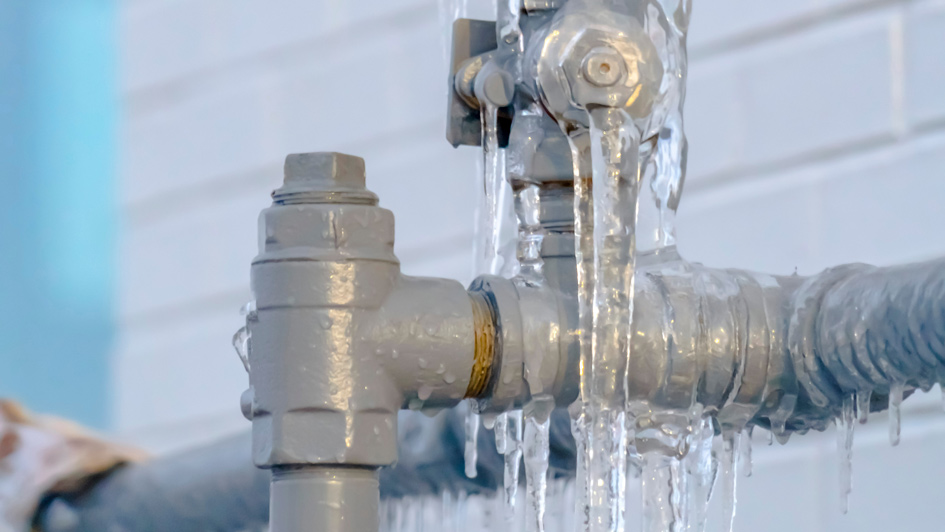
Snow-covered winter weather presents a great opportunity for a fun day sledding down the neighborhood hill or snowball fights in the front yard. At the same time, winter weather can be hard on your home. Excessively cold conditions can encourage the water lines in your house's plumbing system to freeze and burst, which could lead to significant water damage and enduring negative effects.
When your pipes are covered in ice, you should contact a plumber in Pella to handle the problem. That being said, there’s multiple things you can do to stop this from happening – and even minor prevention can go a long way.
What Pipes Are at a Higher Chance of Freezing
The pipes at the highest risk of freezing are uninsulated water lines. Common locations for uninsulated pipes are within attic crawlspaces, near exterior walls, in the basement or even running underneath a modular home. Water lines that are not properly insulated are at the biggest risk.
How to Keep Pipes from Becoming Frozen in Your Home
Sufficiently insulating exposed water lines is a good first step to keeping your pipes ice free. You’ll often locate lots of these materials from your local plumbing company, and may also already have some somewhere in your home.
Try not to cover other flammable insulation materials where they might be caught on fire. If you don’t feel comfortable insulating the pipes on your own, contact your local plumbing services professional in Pella to do the job.
If you do decide to insulate the pipes by yourself, popular insulation materials for pipes are:
- Wraps or roll insulation: Lots of plumbers, hardware stores and national retailers sell insulation – usually fiberglass, foam wraps or pipe sleeves – that you can use to cover or fit around your pipes. They are sold in different lengths and sizes to suit the needs of your home.
- Newspaper: In a pinch, newspaper can be used for insulation. If the weather is going to get cold and you aren’t able to buy insulation before then, try wrapping uninsulated pipes in this.
- Towels or rags: If you aren’t able to buy insulation and don’t have any newspaper close by, wrapping particularly vulnerable pipes with towels or clean rags as a final effort may be just enough to keep the cold air off the pipes.
Another preventative step you can attempt to stop pipes from becoming frozen is to fill any cracks that may allow cold air inside your home. Keep an eye on the window frames, which can allow in surprisingly strong drafts. Not only will this help to prevent your pipes from freezing, but it will have the additional benefit of making your home more energy efficient.
Five More Ways to Keep Your Pipes from Freezing:
- Open the cabinet doors. Opening the cabinet doors underneath the sinks and other spaces of your home with pipes will enable more warm air from the rest of the room to get to the pipes.
- Letting water drip. Keeping a flow of water by letting your faucets move even just a bit can help avoid frozen pipes.
- Open interior doors. By opening doors for rooms or hallways, your home can be heated more equally. This is especially important if you have a room that is generally colder or hotter than other rooms.
- Close the garage door. The exception to the open doors recommendation is the garage door, which you should keep down – particularly if your water lines run through the garage.
- Keep the heat consistent. Experts suggest setting the thermostat at a constant temperature and leaving it there, rather than permitting it to get cooler at night. Set it no colder than 55 degrees.
How to Prevent Pipes from Freezing in an Empty Home
When you’re at home, it’s easy to recognize when something breaks down. But what added steps can you attempt to prevent pipes from freezing in an empty home or vacation home when the damages from a frozen pipe might not be discovered for some time?
As with your primary residence, insulating any exposed water lines, opening interior doors inside the home and winterizing the vacant home are the best steps to attempt first.
Alternative Steps to Stop Pipes from Freezing in an Empty Home:
- Leave the heat on. Even though you won't always be home, it’s best to keep the heat on – even if you switch the thermostat down colder than you would if you were there. As with a primary residence, experts recommend keeping the temperature at no lower than 55 degrees.
- Shut water off and drain the lines. If you’re going to be away for an extended period of time or are winterizing a seasonal cabin or cottage, switching the water off to the house and clearing the water out of the water lines is one way to stop pipes from freezing and bursting open. Don’t forget to drain the water out of your appliances, such as the hot water heater, and the toilets. See to it that you empty all the water from the system. If you’re unsure of how to drain the water from the pipes, or don’t feel secure doing it yourself, a plumber in Pella will be happy to assist.



